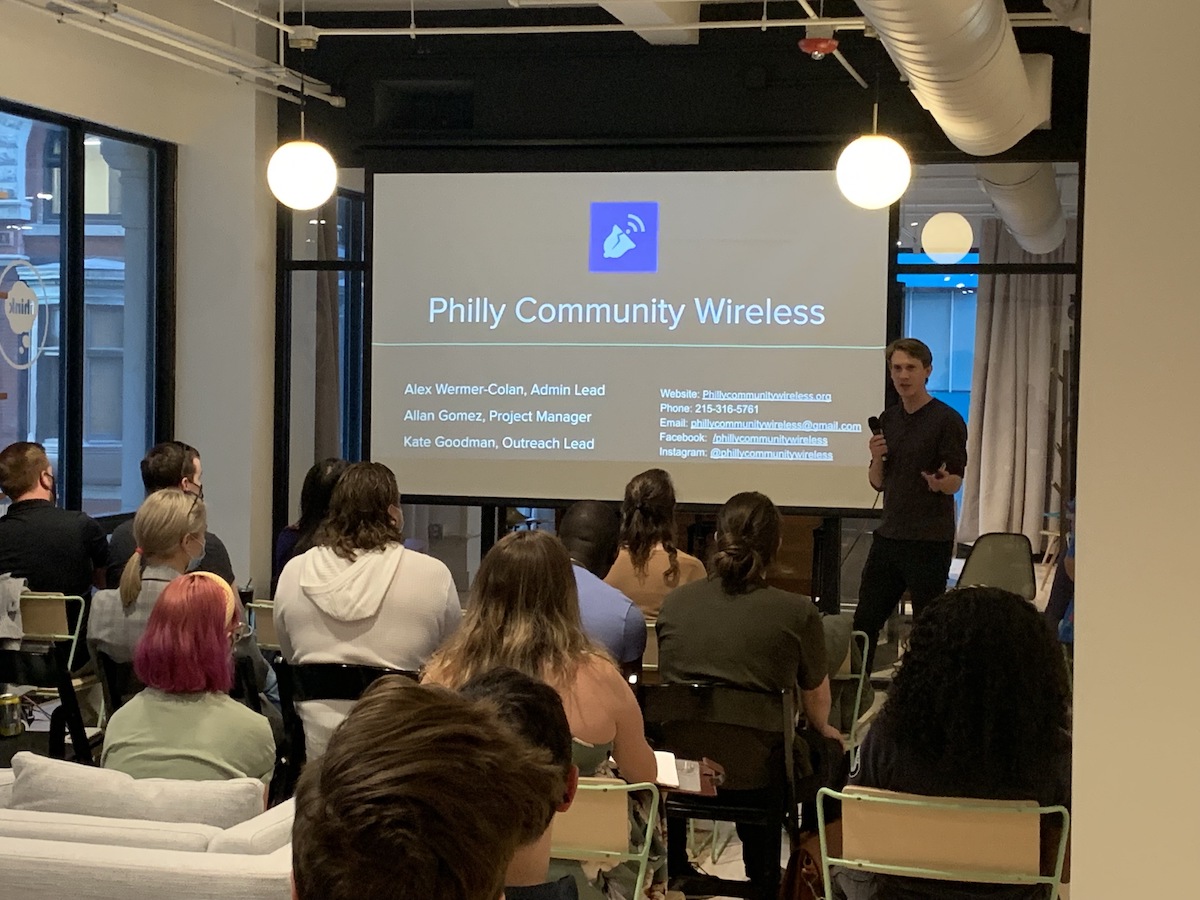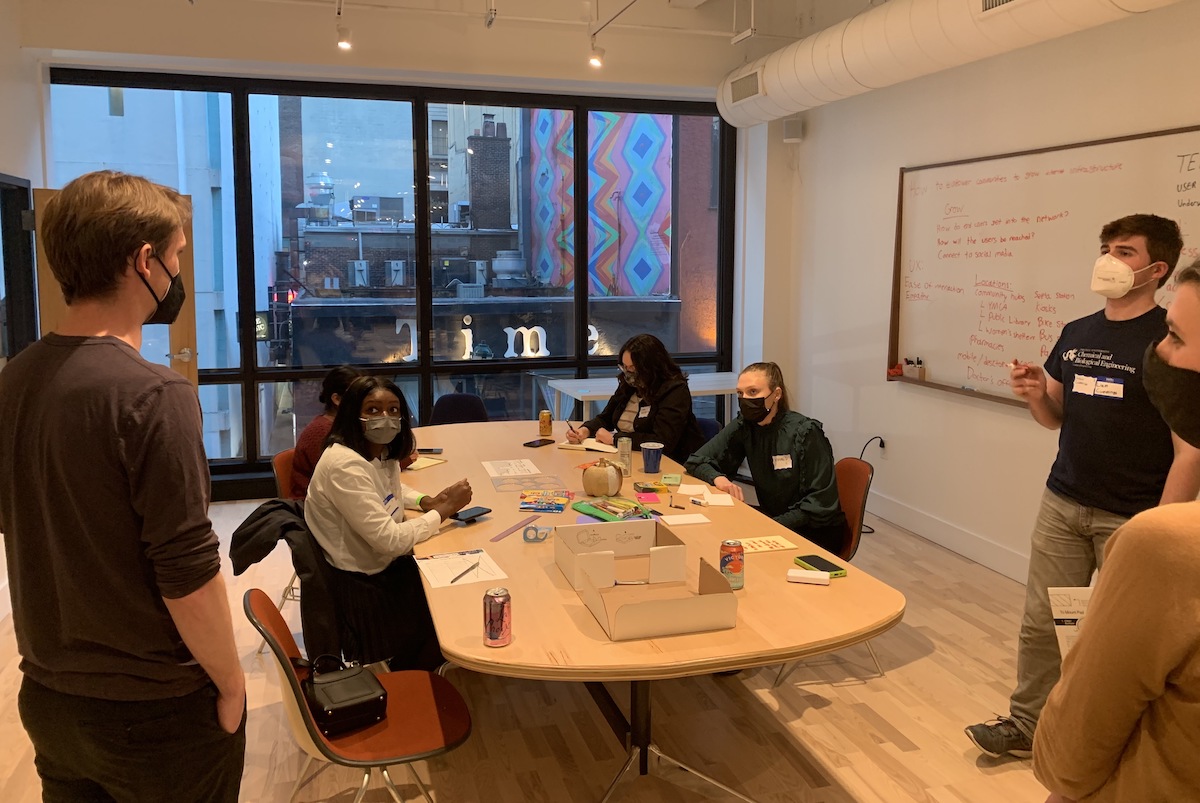How do you get community members to engage with a wireless internet structure, sans tech solutions?
It was the challenge posed to UX designers at PhillyCHI’s annual Design Slam, a one-hour, “throw strangers together” hackathon-style event that the org has hosted for several years now and tends to yield some interesting, innovative results.
This year, the group gathered folks at Think Company’s offices in Center City during Philly Tech Week 2022 presented by Comcast, welcoming around 60 user experience pros to take on a challenge posed by Philly Community Wireless (PCW).
The access-minded group is building a free, mesh Wi-Fi network in the Norris Square neighborhood. Its leaders asked Design Slam attendees to deploy UX thinking to empower members of its community to grow and maintain the wireless structure:
“How can we help people reorient themselves from solely end-user status to engaged owner of the network?”
The ideas they came up with over one hour were judged by a team from PCW, former PhillyCHI board chair Ben Swofford and this reporter. It was my first time at a UX design slam — as well as my first time judging such a competition, not just covering it — but the challenge within the challenge was steep: Get people who don’t readily access the internet to do so, and do it without leaning totally on tech-based solutions.
PCW was looking for ways to engage with four types of users: private residences, businesses, community members and nonprofits. After being split into 10 random teams, participants had one hour to come up with a solution or strategy in response to the org’s challenge.

The UX career path
I talked to Kieran Riley Abbott, PhillyCHI’s community coordinator, while the teams got underway. She, like many others I talked to during the night, has a background in the arts. I told her I noticed more women and more diversity than most other tech events I attend.
Abbott said she’d always been interested in technology and computers, and played video games growing up. She’d met a fork in the road when deciding to pursue design and art in college, and first went the art route.
“After five of six years working in the art world in galleries and nonprofits, the work I was doing was becoming really unfulfilling, not paying very well and not progressing anywhere,” she said.
She recalibrated, and UX design has been more engaging career, she said. When she’s not organizing events or meetups for the PhillyCHI board with her five other board members, Abbott’s full-time gig is as a UX designer for BI WORLDWIDE, a global engagement agency based out of Minneapolis.
“You’re problem solving and you’re getting to learn for people,” she said of UX. “It’s a job that’s constantly changing. It’s in a newer field so it’s constantly evolving and I feel like you can never stop learning new things about it.”
PhillyCHI wanted to partner with a community organization that would prompt “user experience thinking with not just a screen,” Abbott said, which ultimately led them to PCW. The challenge in this case was interactive, spatial, and theoretical, though it’s about also internet access. But the organizer said her team wasn’t expecting traditional technical solutions — rather, out-of-the-box attempts.
“I think it’s more about solving the problem of the group and the user in whatever way,” she said. “If people don’t have access to the internet, a website isn’t going to help them.”
10 ideas for community buy-in
Midway through the hour, I shadowed Alex Wermer-Colan, administrative lead of PCW, as he visited the working groups for three minutes of rapid-fire questions that might help the teams approach their solution better. They asked:
- How are people in Norris Square who don’t have Wi-Fi at home currently communicating? — McDonalds’ free Wi-Fi, the Philly schools’ network and community events like cookouts, Wermer-Colan answered.
- Is the org on social media? — Yes, Instagram and Facebook.
- Are folks currently being incentivized to participate? — Not monetarily, but PCW is talking to them about how it can benefit them if they already have access at home, and how it will help their neighbors.
- How far is the current Wi-Fi’s reach extend? — One square mile, with an adaptor reaching a few hundred feet by itself.
- And how much does it cost to install? — $200 for the hardware mesh kit, with a rooftop antenna costing $300.
By the hour’s end, each of the 10 groups presented their solution for getting more of the community to buy-in. The ideas included installing PCW modems in schools, crafting a mural about digital access within Norris Square with a QR code to learn more about PCW, driving a truck with internet access around different communities, creating a visibility campaign for local businesses, hosting community events, and one pie-in-the-sky plan of “PCW in your pocket” — small business cards that allow you to access the internet wherever you go.
Judges scored the ideas on feasibility, creativity, sustainability and presentation. While some sounded ideal or innovative, it’d take too many resources to pull them off, PCW reps explained.
The ultimate winner struck the right chord of community-based and feasible, we decided. Group 8 proposed a three-prong event system, tagging in community groups, nonprofits, and local businesses over the course of events to spread trust and buy-in with neighbors. The plan even featured a parachute-style attraction à la elementary school gym class used to discuss community investment.
“Some of these things we’re doing and can obviously do them better, but gamifying it was brilliant,” said Allen Gomez, PCW’s project manager. “I think that hit a lot of the check marks for us in finding engagement.”







